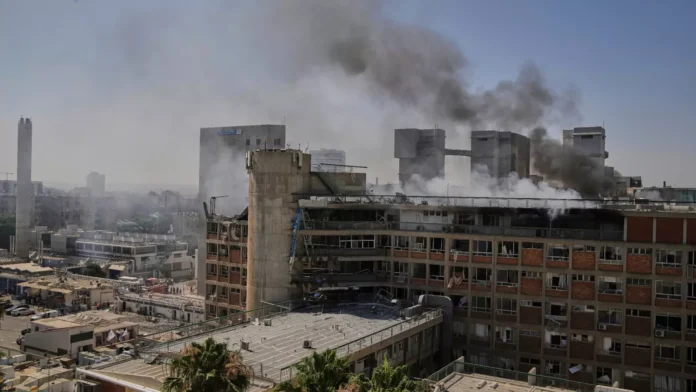Early Thursday, an Iranian ballistic missile struck Soroka Medical Center in Beersheba, causing extensive damage to the surgical ward and wounding at least 80 people, most with minor injuries. The missile’s large warhead demolished windows and collapsed ceilings in one wing, though a recent evacuation of that area—prompted by rising tensions—likely saved many lives politico.com.
Soroka serves roughly one million residents of southern Israel. Within hours of the strike, the hospital halted new admissions except for life‑threatening cases, and began transferring patients to other facilities, including Jerusalem’s Hadassah network. By Thursday afternoon, roughly 300 of its 700 in‑patients remained on site, with the rest already moved to safer locations politico.com.
The Israeli Defense Forces publicly denounced the attack as deliberate, accusing Iran of targeting a civilian medical facility. Iranian officials countered that their true aim was a nearby military command center, and that any damage to the hospital was collateral. They insisted that the center had treated combatants and was therefore a legitimate target.
Israel’s multi‑tiered air defenses—which include the Iron Dome for short‑range threats, David’s Sling for medium‑range missiles, and the Arrow systems for high‑altitude intercepts—have largely held firm. Still, Iran’s latest barrage of over 400 missiles and hundreds of drones has stressed the network and allowed some projectiles through, demonstrating the challenges of defending against saturation attacks politico.com.
From the rubble of Soroka’s surgical ward, Prime Minister Benjamin Netanyahu delivered a forceful statement: “We will exact the full price from the tyrants in Tehran.” He pledged that Iran would “pay a heavy price” and signaled immediate orders for the Israeli Defense Forces to intensify strikes on strategic Iranian sites. Defense Minister Israel Katz went even further, declaring that Iran’s Supreme Leader “can no longer be allowed to exist” cbsnews.com.
In recent days, Israel has already struck Iran’s nuclear facilities at Natanz and Arak, aiming to disrupt uranium enrichment and heavy‑water production. These operations underscore a long‑standing strategy to forestall Tehran’s nuclear ambitions by targeting critical infrastructure.
Personal Analysis
This strike on a civilian hospital marks a dangerous escalation in the Israel‑Iran confrontation. By hitting Soroka Medical Center, Iran not only challenged Israel’s defenses but also shifted the conflict narrative from military targets to humanitarian concerns. Netanyahu’s vow of severe retaliation, while expected, risks further civilian harm on both sides. Israel’s willingness to attack Iran’s leadership and nuclear sites may deter future strikes, yet it also raises the stakes for unintended consequences. As both nations dig in, regional actors and global powers face hard choices: push for diplomacy now or watch the cycle of violence deepen.

